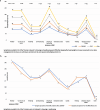Living with Dysphagia: A Survey Exploring the Experiences of Adults Living with Neuromuscular Disease and their Caregivers in the United Kingdom
- PMID: 38250781
- PMCID: PMC10977401
- DOI: 10.3233/JND-230002
Living with Dysphagia: A Survey Exploring the Experiences of Adults Living with Neuromuscular Disease and their Caregivers in the United Kingdom
Abstract
Background: Dysphagia is common in adults living with neuromuscular disease (NMD). Increased life expectancy, secondary to improvements in standards of care, requires the recognition and treatment of dysphagia with an increased priority. Evidence to support the establishment of healthcare pathways is, however, lacking. The experiences of people living with NMD (pplwNMD) and their caregivers are valuable to guide targeted, value-based healthcare.
Objective: To generate preliminary considerations for neuromuscular dysphagia care and future research in the United Kingdom, based on the experiences of those living with, or caring for, people with NMD.
Methods: Two surveys (one for adults living with NMD and dysphagia, and a second for caregivers) were co-designed with an advisory group of people living with NMD. Surveys were electronically distributed to adults living with NMD and their caregivers between 18th May and 26th July 2020. Distribution was through UK disease registries, charity websites, newsletters, and social media.
Results: Adults living with NMD receive little information or education that they are likely to develop swallowing difficulties. Most respondents report wanting this information prior to developing these difficulties. Difficulties with swallowing food and medication are common in this group, and instrumental assessment is considered a helpful assessment tool. Both adults living with NMD and caregivers want earlier access to neuromuscular swallowing specialists and training in how best to manage their difficulties.
Conclusions: Improvement is needed in the dysphagia healthcare pathway for adults living with NMD to help mitigate any profound physical and psychological consequences that may be caused by dysphagia. Education about swallowing difficulties and early referral to a neuromuscular swallowing specialist are important to pplwNMD and their caregivers. Further research is required to better understand the experiences of pplwNMD and their caregivers to inform the development of dysphagia healthcare pathways.
Keywords: Swallowing; advisory group; facioscapulohumeral muscular dystrophy (FSHD); myotonic dystrophy type 1 (DM1); spinal muscular atrophy (SMA).
Conflict of interest statement
The authors have no conflict of interest to report
Figures
Similar articles
-
Screening for oropharyngeal dysphagia in adult patients with neuromuscular diseases using the Sydney Swallow Questionnaire.Muscle Nerve. 2021 Sep;64(3):277-284. doi: 10.1002/mus.27254. Epub 2021 May 7. Muscle Nerve. 2021. PMID: 33890683
-
Validation and psychometric properties of the Turkish version of Neuromuscular disease Swallowing Status Scale (NdSSS) in patients with oro-pharygo-esophageal dysphagia in neuromuscular disorders.Acta Gastroenterol Belg. 2022 Jan-Mar;85(1):21-27. doi: 10.51821/85.1.8929. Acta Gastroenterol Belg. 2022. PMID: 35304990
-
The relationship between pulmonary and swallowing functions in patients with neuromuscular diseases followed up by a tertiary referral center: a cross-sectional study.Logoped Phoniatr Vocol. 2022 Jul;47(2):117-124. doi: 10.1080/14015439.2021.1879254. Epub 2021 Feb 15. Logoped Phoniatr Vocol. 2022. PMID: 33586591
-
Swallowing and Secretion Management in Neuromuscular Disease.Clin Chest Med. 2018 Jun;39(2):449-457. doi: 10.1016/j.ccm.2018.01.007. Clin Chest Med. 2018. PMID: 29779602 Review.
-
[Diagnosis and treatment of dysphagia in patients with neuromuscular disease].Pneumologie. 2008 Mar;62 Suppl 1:S35-8. doi: 10.1055/s-2007-1038100. Pneumologie. 2008. PMID: 18317982 Review. German.
Cited by
-
Caregivers' Knowledge and Experiences in Recognizing and Managing Dysphagia in Patients with Myopathy.Clin Pract. 2025 Mar 13;15(3):61. doi: 10.3390/clinpract15030061. Clin Pract. 2025. PMID: 40136597 Free PMC article.
-
Transition experiences of patients with post stroke dysphagia and family caregivers: A longitudinal, qualitative study.PLoS One. 2024 Jun 4;19(6):e0304325. doi: 10.1371/journal.pone.0304325. eCollection 2024. PLoS One. 2024. PMID: 38833445 Free PMC article.
References
MeSH terms
LinkOut - more resources
Full Text Sources
Medical



